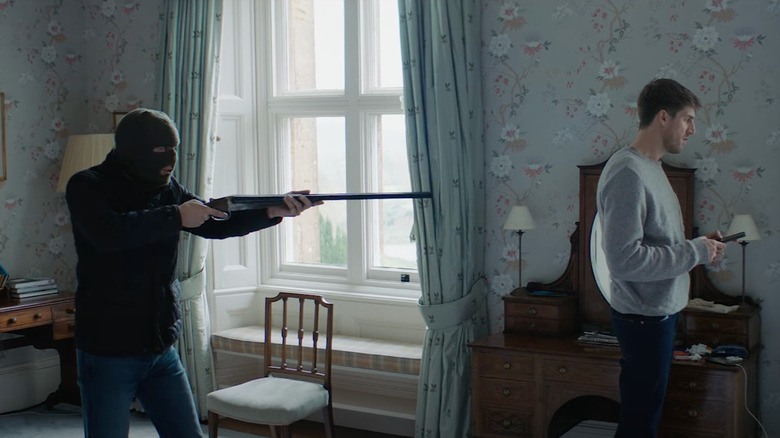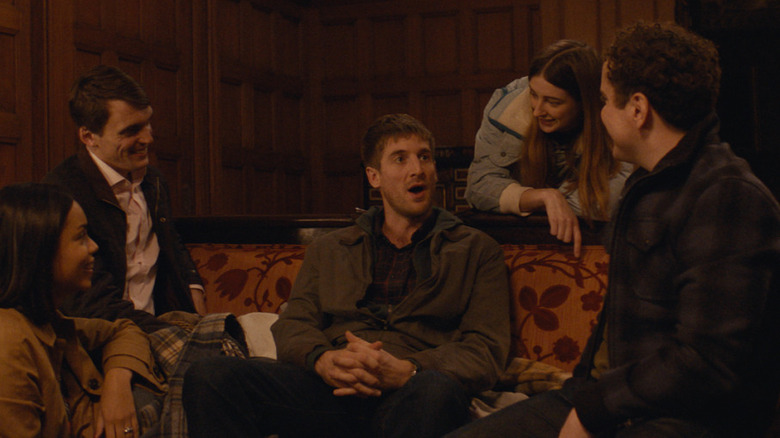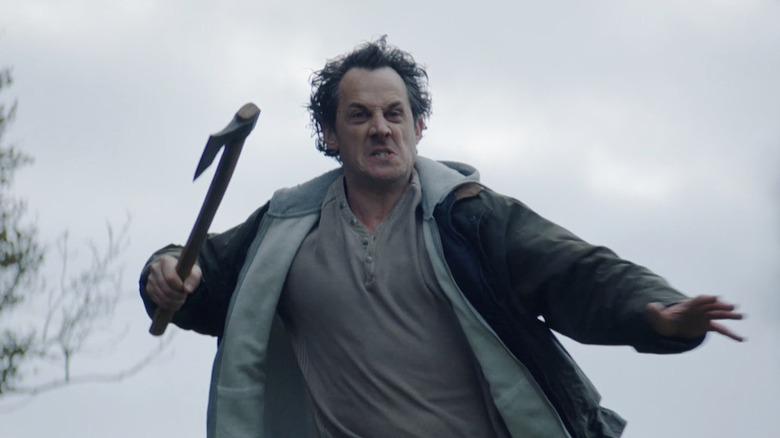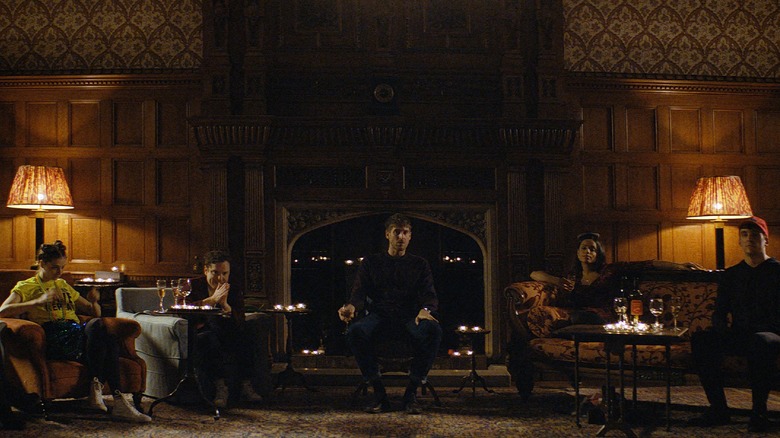All My Friends Hate Me Writers Tom Palmer And Tom Stourton Are Here To Make You Squirm [Interview]
"All My Friends Hate Me" is an anxiety film. Anyone who's ever felt out of place among a group of strangers — or even worse, a group of friends or family members — will recognize the social anxiety on full display in the low-key horror-comedy. In the film, Pete (Tom Stourton) goes on a weekend getaway with friends from college, but they no longer relate like they used to. Things get awkward and far worse from there.
Co-writers Tom Stourton and Tom Palmer crafted a story that keeps an audience on its toes. Even when nothing out of the ordinary or terrible is happening, you still expect the worst around the corner, thanks to the way director Andrew Gaynord embraces the cringe comedy. Recently, the star and co-writers behind "All My Friends Hate Me" talked to us about crafting the delightfully mean-spirited movie about social anxiety.
'I became convinced that I'd been invited as a joke'
This is oddly very universal, just feeling out of place in a social situation. Is that how the story was born?
Palmer: The idea came from a very sort of specific instance like that, which happened to Tom, actually, at a wedding.
Stourton: I got invited to a wedding by some old uni mates that I hadn't seen in a while, and I was a bit surprised to get the invitation. I stupidly went to a party the night before, and then turned up on not much sleep. And then, throughout the course of the day, I became convinced that I'd been invited as a joke, basically. That I was going to be called out during the speeches at the end, and sort of humiliated. Obviously, that didn't happen.
I think that felt like an interesting set up: Going into an environment where you're surrounded by mates, and feeling like there's some level of hostility. And the idea that you could have a horror film that was all in someone's head felt like a good horror-comedy mix. Yeah, lots of people come up and say the same thing. I guess we're sort of simultaneously happy about that, but also sad that so many people are feeling paranoid out there.
Your experience at the wedding is probably the truth, though — that people aren't thinking about you as much as you think they are.
Palmer: No, and that's definitely part of the fun with the whole film, just playing with Pete's subjective perception of everything. Does it all boil down to him just being a completely narcissistic, overprivileged, self-obsessed man? Is that the reality? Is that the core message? Or is it just this idea of, well, what if actually for one day, and one party, all of those fears actually were true? You know, this time, it wasn't a joke. All those thoughts you're having are playing out for real. For some reason that just gave us pleasure to explore that horrible nightmare of something like that happening for real.
Stourton: Yeah, because we all want our friends to say that thing of like, "No, don't worry. You were fine last night, you were in your own head." One of the early scenes we wrote was that one on the stairs, with the character called Fig. And she's like, "Well, I just think you should know you're not doing too good this weekend." We thought it'd be funny — what if your friend turned around to you and was like, "Yeah, you were awful." How disorienting would that be?
But refreshingly honest, too.
Right. Yes. We probably ... maybe, maybe. Yeah, that's an interesting point. Maybe we could all do with a bit more honesty. I don't know. I don't know if I'm ready for that.
Without spoiling anything, were you two always building towards the ending? Was that always the ending imagined?
Stourton: Honestly, we came up with probably 10 to 12 different endings before we landed on that. We knew how we were starting. We knew that we were chasing this feeling of, as we were saying, what if that feeling you had plays out for real? Like a guy turning up to his birthday, an empty house. It always kind of felt like this very pure and clear vision we were chasing, and it took very little time to write the first 90% of the film.
And then that ending, we experimented with a lot of different versions. You know, versions which were a bit more blood and guts. Versions that were a bit more thriller mystery, big reveal. He did actually do something that he's being punished for. But then it just felt that the most truthful thing we could do, and the most satisfying ending, was to just leave people sitting in that feeling of uncertainty and feeling unsettled. So, that's how we landed on the final ending.
Palmer: But it was a lesson in maybe, in the future, having an ending in mind before you start writing. We were kind of coming up to the shoot day when we had to film the last scene, and we were still trying to get a line that felt satisfying enough that could deliver that final dose of doubt to Pete's brain.
'This is just like a crying little boy'
I've heard people say, "Pete needs better friends," but personally, I think his very flawed friends need better friends. How've you found the reactions to be across the board in how people react to this group?
Palmer: It's a good point. What was fun was just never making anything black and white. So, although his friends do seem like total assholes in some respect, some of them are just at least honest about how kind of obnoxious they are, and that in some way makes them a bit more redeemable than Pete. Yeah, he's above it, and he's trying to be better, but he also kind of keeps telling people that he is trying to be better, and that is quite off-putting.
We loved writing the scene with the character Archie, who's just the obnoxious jock. He finally breaks down and confesses to the real person he is underneath. This is just like a crying little boy. I think there's kind of some truth in that. We never wanted to make it black and white with who's good, who's bad.
How did you work through the personas of the group? How'd their identities take shape?
Palmer: They were definitely all sorts of types that we'd met at school and university, I'd say. Like, generic enough not for there to be anyone that's really upset out there, because they've been portrayed in the film. They're all sorts of types, aren't they, Tom? That we've met over the years.
Stourton: I think they feel very specific to us, but then at the same time, I'm always amazed by how many people do say, "Oh, everyone's got an Archie in their friendship group, no matter what background or context they're from." It's just that person who's brash and confident, sort of funny but also slightly offensive. Probably underneath all that is someone who's vulnerable and quite scared.
So, we never tried to make them like archetypal friends, they just felt like there were people we had come across. I think that sometimes that specificity can make it weirdly more accessible and more approachable, and people can draw more parallels with their own lives.
Palmer: And a character like George, who owns that massive house. He has this larger than life, "Toad of Toad Hall," "look at my big house" kind of guy [energy]. Actually, it was more interesting for him to be quite restrained and understated. Despite sitting on this country pile, he was actually one of the more emotionally stable of the group. So, decisions like that to try make him, as Tom says, too archetypal.
When they go bird shooting and Pete hits nothing, it causes a rift among the group. Is that accurate? Do people take it that seriously?
Stourton: I don't know, because no one really got it when we were filming. Everyone was like, "Why is everyone so angry at Pete?" I guess to us it was just so funny that it was like, Pete had crossed some weird, surreal etiquette thing by just being a bit bad, that he'd really pissed everyone off.
I don't know if that's realistic, but I felt something quite truthful in the modern kind of progressive city individual, thinking that they're being quite down with the working classes. And then, Pete seems to completely put his foot in it, and offends this countryside gamekeeper by not shooting any birds or by doing an impression of him. It felt really fun, this idea of someone squirming trying to not be classist so hard, that he ends up making it worse for himself. It felt truthful.
Palmer: But it is true, that is one of the more surreal. I think we're sort of pushing in terms of reality. That is one of the moments we felt we could just push it a bit, you know? To make Pete cry, which he does in the scene.
'Start with an ending'
There is a lot of cringing and squirming involved with this movie. How'd you figure out the pace, when to ramp things up or give Pete and the audience a breather?
Palmer: It was really important to get it right, because we didn't want people to be like, "Oh, just get in your car." It was about trying to kind of breadcrumb in those little moments where his friends would go, "No, we love you, you know? It's good that you're here." And sort of getting that balance was something that was definitely important to do. I think there are just about enough moments where it's like, "Okay, I can see that he gets on with these people, but...."
Stourton: I think when they did the first assembly of what we shot, it came out at like two hours and ten minutes or something. I mean, we really overwrote it. It was our first feature. We were inexperienced, so we really overwrote it. It was the director, Andrew, and the editor, Sam, that were just able to just slice it up and reinforce that kind of act one, act two, act three structure. Hopefully, each scene just leaves you with a reason or a question to really need to watch the next scene and feel yourself kind of carried along with the momentum.
As you said, this is the first movie you wrote. What were the big lessons?
Palmer: Start with an ending. It was really good to just know that there was a feeling that we wanted to keep, underlying every scene. If we were a bit lost in what a scene was about, you could just come back to like, "Okay, well what's the best way of summoning up that anxiety?" I think we've tried to recreate that moving forward. It would be good to do that.
Stourton: Once we had the script, we spent a lot of time worrying about how personal and authentic it was to us. It's just been interesting to discover that it — as I was alluding to earlier, it doesn't actually make it inaccessible, just because it's quite a specific thing that happens, about specific types of people from university. It actually feels like that has given it strength and made it feel a bit fresher. People seem to go for that, which is really encouraging. I think that's given us a bit more faith for the next things we write, to trust our gut a bit more, not try and retrospectively create something that might be commercial, or accessible, or whatever.
"All My Friends Hate Me" is now available on VOD.



